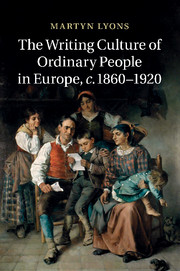Book contents
- Frontmatter
- Contents
- Illustrations
- Maps
- Acknowledgements
- Note on translations and transcriptions
- 1 Ordinary writings, extraordinary authors
- 2 Archives for an alternative history
- 3 ‘Excuse my bad writing’
- 4 Literary temptations
- 5 France
- 6 France
- 7 Family, village and motherland in the writing of Italian soldiers, 1915–1918
- 8 Italian identities ‘from below’ and ordinary writings from the Trentino
- 9 Love, death and writing on the Italian front, 1915–1918
- 10 Spain
- 11 Family strategy and individual identities in the letters of Spanish emigrants
- 12 Order and disorder in the ‘memory books’
- 13 Conclusions
- Bibliography
- Index
- References
2 - Archives for an alternative history
Published online by Cambridge University Press: 05 November 2012
- Frontmatter
- Contents
- Illustrations
- Maps
- Acknowledgements
- Note on translations and transcriptions
- 1 Ordinary writings, extraordinary authors
- 2 Archives for an alternative history
- 3 ‘Excuse my bad writing’
- 4 Literary temptations
- 5 France
- 6 France
- 7 Family, village and motherland in the writing of Italian soldiers, 1915–1918
- 8 Italian identities ‘from below’ and ordinary writings from the Trentino
- 9 Love, death and writing on the Italian front, 1915–1918
- 10 Spain
- 11 Family strategy and individual identities in the letters of Spanish emigrants
- 12 Order and disorder in the ‘memory books’
- 13 Conclusions
- Bibliography
- Index
- References
Summary
Lidenbrock’s paradox
In the last thirty years, a number of specialist archives have emerged specifically devoted to the writings of ordinary people, and initiatives in Italy and Spain have led the way. In Spain, Antonio Castillo Gómez and Verónica Sierra Blas at the University of Alcalá de Henares co-ordinate a loose network of such institutions. Many such archives, like the small one at La Roca del Vallès near Barcelona, are inspired by left-wing democratic aspirations and also by regionalism – in this case Catalan. In the Nordic countries, folklore studies have provided a strong impetus for the collection of writings by farmers and peasant intellectuals. The Finnish Literature Society, established in 1831, solicited and collected ordinary writings as expressions of a national identity rooted in folk traditions. Various Italian centres, as we shall see in this chapter, offer invaluable materials to the historian of everyday writing practices. These new archives of popular writing are subtly different, but they all express a political agenda. They exist to promote respect for popular writings, to validate popular memories, and to offer a radical alternative to the official records found in other administrative and institutional depositories.
The proliferation of archives of popular writing in recent decades aims at inverting conventional and elitist perspectives on history. In Jules Verne’s novel Voyage au centre de la terre, Professor Lidenbrock and his intrepid companions descend an Icelandic volcano and journey deep under the earth’s crust, eventually reaching the centre of the planet and discovering a new world. The lesson of this tale for historians is that by burrowing ever further ‘below’, we can establish a new ‘centre’. This is what Johan Svedjedal calls the ‘Lidenbrock Paradox’, and perhaps it illuminates history from below: if we pursue what at first appears marginal with enough determination, we may establish a new core which re-centres the historian’s angle of vision.
- Type
- Chapter
- Information
- Publisher: Cambridge University PressPrint publication year: 2012



